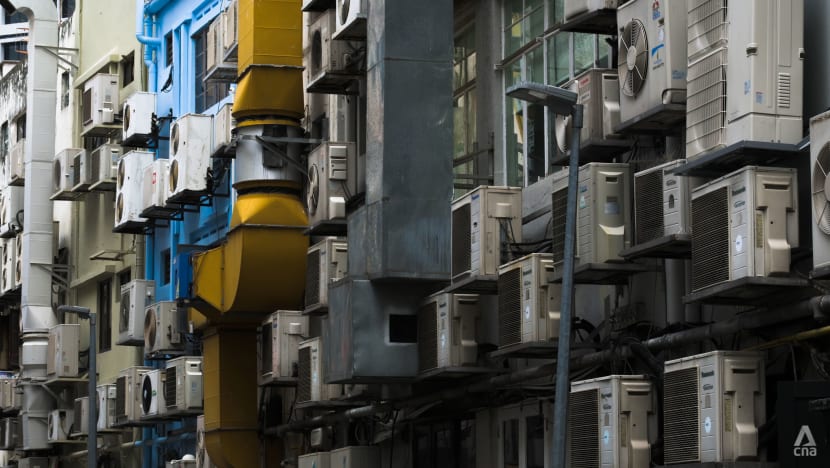Commentary: Should Singapore residents invest in energy-efficient homes to save costs?
Select businesses in Singapore can enjoy one more year of government grants to invest in energy efficiency. David Broadstock of Energy Studies Institute explores if households should be empowered to do the same amid a cost-of-living crisis.

Rows of air conditioning condenser units lining the back of a building in Singapore. (Photo: CNA/Calvin Oh)
SINGAPORE: Singapore’s Budget 2023 was themed “moving forward in a new era”. This “new era” is a reference to changed global conditions. The COVID-19 pandemic has altered the supply chains feeding Singapore's import-dependent economy.
Ongoing conflict in Ukraine has further reconfigured major commodity supply chains to such an extent that they are unlikely to recover to a pre-COVID state for years, if at all. This has translated into a cost-of-living crisis worldwide.
Unusually high energy prices have been a defining feature of this crisis. Singapore authorities have made regulatory revisions and introduced safeguards such as standby fuel storage facilities, to help moderate the influence of global commodity prices on domestic energy costs.
But in this “new era”, we need to stretch beyond coping with volatile prices to living with sustained higher energy costs.
Deputy Prime Minister and Finance Minister Lawrence Wong announced on Tuesday (Feb 14) that the Energy Efficiency Grant (EEG) - which helps support food services, food manufacturing and retail sectors to invest in energy efficiency - will be extended for one more year as part of the Budget 2023 package.
The EEG is targeted at small- to medium-size enterprises, which account for around 70 per cent of employment and 99 per cent of the total number of firms.
INVESTING IN HOUSEHOLD ENERGY EFFICIENCY
Promoting continued energy efficiency improvements by extending the EEG is welcome. Yet the average person on the street continues to feel the squeeze of high energy prices. Is there a missed opportunity to empower households with new and targeted household energy efficiency improvement schemes?
Investing in household energy efficiency is important in two ways. First, it enables households to use less electricity for the same activity.
According to the National Environment Agency (NEA), energy-intensive activities, namely air-conditioning, refrigerating or freezing food, and water-heating account for about 50 per cent of household energy consumption. Optimising power usage for these activities will result in cost savings, freeing up more money for other things.
A second and crucial benefit of improved energy efficiency is that it reduces our individual carbon footprint. Slowing climate change is something we should all aim for.
Achieving energy efficiency improvements may also require lifestyle changes. For example, many of us might reach for the air-conditioner remote to cope with mid-day heat, but often a standing fan will suffice to stay comfortably cool. Estimates by the NEA suggest that just this one change can save a household around S$440 a year.
Other habits like switching off computers when not in use, or lights when rooms are vacant will also offer savings.
CHANGING THE WAY HOUSEHOLDS CONSUME ENERGY
Households purchase energy-consuming equipment, not because they want the equipment, but because they want the “energy service” it provides. For example, we desire hot water for drinking - the heating of the water is the energy service.
My purchase of a kettle is to conveniently access this energy service. The same is true for air-conditioning, for example where households purchase conventional split-unit air-conditioning systems. In this setting, each household creates and consumes cold air.
There could be another way.
Tengah township is developing a centralised cooling system similar to that currently in use in Marina Bay District. In Tengah, cold air will be produced in a centralised location and distributed as a “service” that households can choose to subscribe to.
Individual households will no longer need to invest in and maintain their own air-con compressors - although they will still need fan systems to circulate the cold air within their homes. The estimated energy savings from this are as much as 30 per cent. Similar approaches are also being considered in Tampines.
PROTECTING HOUSEHOLDS FROM RISING ELECTRICITY PRICES
While this year’s Budget does not directly give residents support to defray high energy prices, this does not mean the household sector has been forgotten. The Energy Market Authority has been very active in reviewing and enhancing the regulatory structure for Singapore’s power sector over the past 18 months.
Benefits to households are expected to include more stable and fair electricity pricing at all times. Moreover, the changes enhance national power infrastructure which will be of wider value to the whole economy, producing additional indirect benefits to households.
Turning back to the Budget 2023 announcement, Mr Wong noted that at a time when some other countries are increasing their reliance on fossil fuels to increase their near-term energy security, Singapore is investing in harvesting solar energy, developing regional power grids and exploring new avenues like clean hydrogen to decarbonise the power sector.
Building energy resilience for an uncertain future will come at a cost, but will yield long-term benefits.
David Broadstock is Senior Research Fellow and Head of the Energy Economics Division at Energy Studies Institute, National University of Singapore.




















